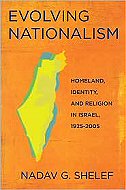Evolving Nationalism :
Homeland, Identity, and Religion in Israel, 1925-2005
|
|
Nadav G. Shelef
|

|

From the Preface
This is a book about how nationalism changes. How do responses to the basic questions about the political community – what is the extent of the homeland, who is part of it, and what principles should guide it – change over time? Even the believers modify their answers to these questions. For observers of Israel, Benjamin Netanyahu's dramatic declaration that he accepted the principle of partition and a two-state solution - made as this book was in production - was another reminder that hard-line nationalists can change their cherished beliefs. This possibility was more widely evident in the context of Israel's disengagement: from the Gaza Strip in the summer of 2005. […]
[...] Nationalists, especially religiously motivated ultranationalists, are not supposed to change their minds. Yet they do, and not just in Israel.
Nationalism evolves. Literally. Changes in the basic understanding of the nation are the unguided by-products of attempts to solve mundane, local, political problems. Strategic reactions to new realities and the changing incentives of national leaders play important supporting roles, but they rarely cause change. I base this claim on head-to-head comparison of the ability of these alternative explanations to account for the pattern of changes in Zionisms and Israeli nationalisms over the last eighty years. Which nationalist movement changed? When? What was the substantive content of the transformation? What leaders, if any, enacted the change? How consistent they were? The systematic reconstruction of the pattern of changes shows that, more often than not, Israeli nationalisms evolved. The argument that nationalism evolves does not negate its power. In fact, the very real potency of nationalism may be one reason international explanations of change fare so poorly in accounting for its transformation. […]
|
|
